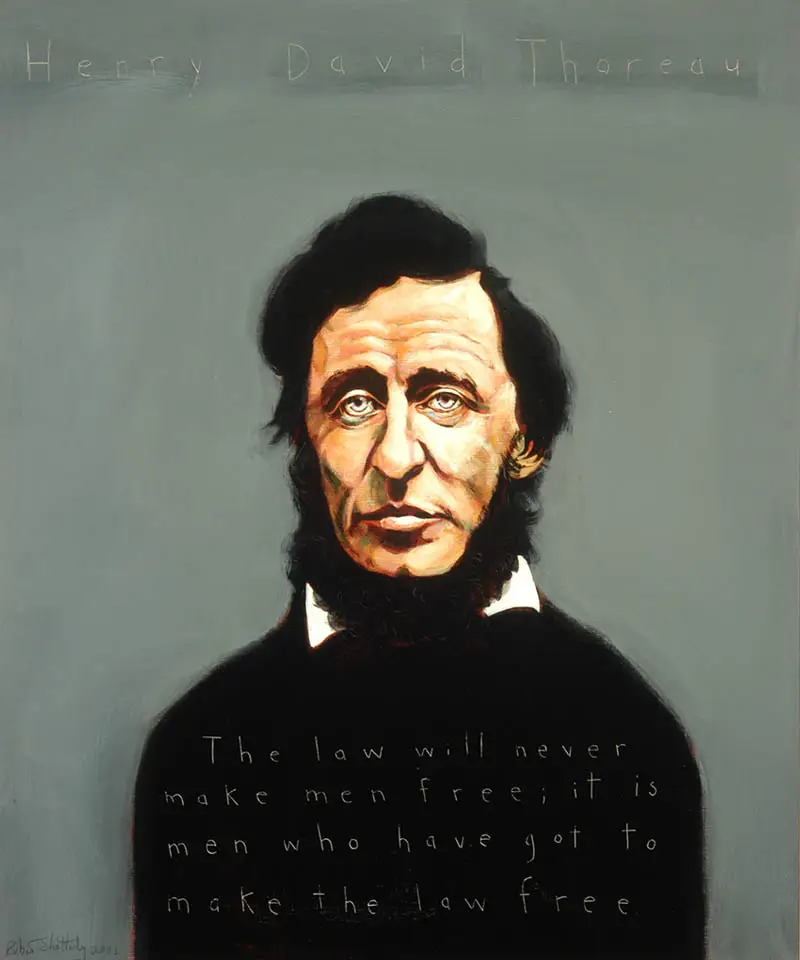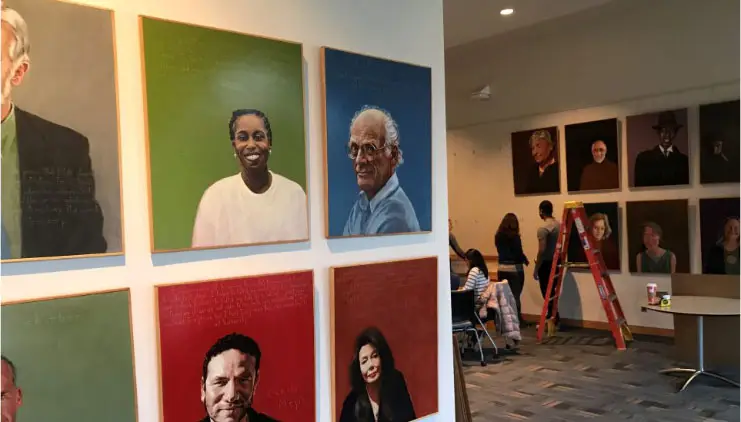
Henry David Thoreau
Naturalist, Writer, Social Critic : 1817-1862
“The law will never make men free; it is men who have got to make the law free.”
Biography
“When I wrote the following pages, or rather the bulk of them, I lived alone, in the woods, a mile from any neighbor, in a house which I built myself, on the shore of Walden Pond, in Concord, Massachusetts, and earned my living by the labor of my hands only. I lived there two years and two months. At present I am a sojourner in civilized life again.”[i] So begins Walden; or, Life in the Woods (1854) one of the most famous books in American history, a book that has been challenging people to reexamine their connection to the natural world and to each other for the last 150 years. Thoreau—born David Henry in 1817—lived the way he wrote: sauntering through his prose and his native Concord woods; rigorously independent and at times prickly; searching for, and often coming to find the wild poetry that describes a life deliberately lived.
Thoreau was born into a 19th century world that was undergoing rapid and massive change. In his short life he witnessed the birth of a market revolution that altered the political, economic, social, and environmental character of the U.S. This was the beginning of the “Age of Go-Ahead,” when getting ahead financially, no matter the social costs, came to define a life successfully lived. The U.S. was also in a period of rapid territorial expansion: at the conclusion of the Mexican American War in 1848, the nation acquired all of the Southwest and California. Thoreau had gone to jail protesting this war: he, like many historians today, considered the war an unjust, imperialistic land grab for the benefit of southern slave-owners. It seemed to Thoreau that, wherever he looked, America was increasingly turning towards a gospel of wealth in which a select few profited from the exploitation of the less fortunate, leaving in their wake both a quietly desperate population and an impoverished landscape. This was the “civilized life” in which Thoreau so ambivalently sojourned.
Often categorized as a nature writer, Thoreau penned hundreds of poems on all sorts of subjects, from friendship to heroism, as well as dozens of political essays—including “Slavery in Massachusetts,” “Walking,” essays in support of John Brown, and “Civil Disobedience,” a text declaring that government is armed not with superior intelligence or honesty, but enforces its will through superior force alone, and that such a government “can have no pure right over my person and property but what I concede to it.[ii]
“Civil Disobedience” would go on to influence both Mahatma Gandhi in his anti-imperialist efforts to rid India of British rule, and Martin Luther King, Jr., in his effort to secure civil rights for all Americans. Yet, in his own lifetime Thoreau was only ever considered to be a somewhat minor follower of Ralph Waldo Emerson’s transcendentalism. Indeed, he was probably better known as Concord’s best land surveyor—a job he took to avidly, because it let him spend his days exploring his town’s landscape. Due in part to the birth of the modern environmental movement in the 1960s, interest in Thoreau has steadily risen—he seems to speak directly to our times. “‘Evergreens’ would be a good title for some of my things,” he had written in 1852.[iv]
If it is possible to reconcile the nature writer with the political theorist, social activist, and surveyor, a clue comes in his posthumously published The Maine Woods (1865). Standing atop Maine’s Mt. Katahdin in 1846, buffeted by wind and fog, Thoreau asked, “Who are we? Where are we?”[v] His insight was that who we are depends on where we are, and that where we are depends on what relationships—to each other, to the natural world—we choose to recognize. On December 3, 1860, Thoreau was counting the rings of tree stumps, trying to find who and where he was. It was a bitterly cold day, and it aggravated the tuberculosis that he had long harbored in his lungs. It took a year-and-a-half for his disease to grow strong enough, but on May 5, 1862, he finally spoke his last words. Reportedly dreaming of wild Maine, he whispered, “Moose…Indians.”[vi]
[i] Henry David Thoreau, Walden; or, Life in the Woods, in Thoreau: A Week on the Concord and Merrimack Rivers, Walden; or, Life in the Woods; The Maine Woods, Cape Cod (New York: The Library of America, 1985) 325.
[ii] Henry David Thoreau, “Civil Disobedience,” in Thoreau: Collected Essays and Poems (New York: The Library of America, 2001) 224.
[iii] Thoreau, “Walking,” in Thoreau: Collected Essays and Poems (New York: The Library of America, 2001) 254-255.
[iv] Thoreau, Journals 1:324.
[v] Henry David Thoreau, The Maine Woods (New York: Harper & Row Publishers, 1987) 95.
[vi] Walter Harding, The Days of Henry Thoreau: A Biography (Princeton: Princeton University Press, 1982) 466.
Programs
Americans Who Tell the Truth (AWTT) offers a variety of ways to engage with its portraits and portrait subjects. Host an exhibit, use our free lesson plans and educational programs, or engage with a member of the AWTT team or portrait subjects.

Education
AWTT has educational materials and lesson plans that ask students to grapple with truth, justice, and freedom.

Exhibits & Community Engagement
AWTT encourages community engagement programs and exhibits accompanied by public events that stimulate dialogue around citizenship, education, and activism.